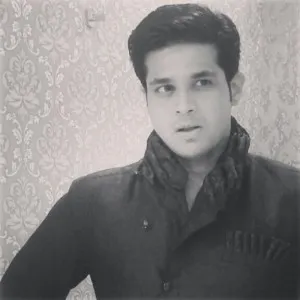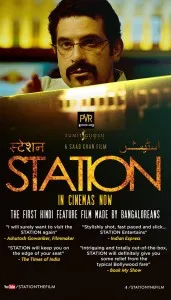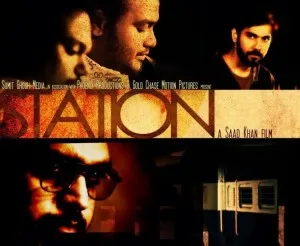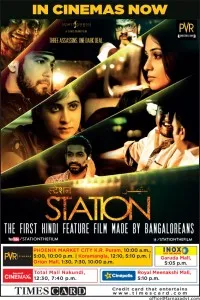An Erstwhile Engineer and a Venture Capitalist came together to create the ultimate Start Up- A Movie
Saad Khan calls Sumit Ghosh a 'Spiritual Entrepreneur'. He goes on to define that term as someone who is passionately dedicated to exploring and promoting new ideas. In the same breath he declares that Ghosh is a hot favourite among the ladies and that he plans to poach himself some girlfriends from his friend's legions of female fans. The easy camaraderie and witty banter that flows between the two friends is such fun to watch that I take it seriously when Saad Khan says, "If Sumit ever leaves my life, I shall commit suicide." Though chalk and cheese they may be, they came together to create a project so unusual that it is a first of its kind in the country. Here they talk about all the labour and languish that went into creating Bangalore's first Hindi film Station.
Sumit Ghosh, a native of Ranchi, came to Bangalore to study computer science engineering at R.V. College of Engineering. While studying there, he set up his proprietary training company called Tranquility Capital. That gave him a cushion to fund other businesses. With his 'hardcore sources' of income taken care of, he began to wonder how to passively generate money. He started getting into various environment friendly ventures bio gas power plant projects, dairy in order to experiment with energy generation from cow dungs and recently stem cell therapy. While he was thus involved in saving the planet, he met Saad Khan.

Saad Khan is a well-known name in the theater and creative circuits of Bangalore. At one point he too had studied engineering, from M.S. Ramaiah Institute of Technology but fortunately saw the error of his ways in time. He went to film school in New York on scholarship, got a master’s degree in filmmaking and then came back to India to make his mark here. Khan has worked as an associate director with Ashutosh Gowariker in Mumbai. His short film another kind of Black was screened at Cannes Film Festival. He founded and heads Centerstage, a new wave media movement in Bangalore that promotes and nurtures artists of the city.

An erstwhile engineer and a venture capitalist coming together to make Bangalore's (even Karnataka's) first Hindi movie. What is the story of your friendship?
Saad Khan: We had first met at Subway. I explained the concept to him. The movie is about three assassins who are waiting at a railway station at two in the night because they have a job to do. And then everything that can go wrong goes wrong.

The co-producer of my movie Hardik had casually introduced me to him. Sumit was not even an aspiring producer as such. He had indicated to Hardik that he was looking to invest in some creative side projects. He was into many businesses to begin with. He runs a hedge fund company, has interests in power plants, etc. Now he wanted to invest in something creative. We had a half hour meeting. At the end when we were walking out of UB City, he handed me ten thousand rupees and told me, 'Let’s get started.'
Sumit Ghosh: I wanted to challenge the creative part of business. I was always into contemporary classical businesses like milk production, power plants, hedge funds, etc. Totally logical businesses. I wanted to try out something which is commercial but also promotes art and culture and the creative talent out there. With this intent in mind I was looking for projects where I could invest and of which I could be a part so that I am able to learn something new. All through my school days I was completely absorbed in studies, never participated in such kind of thrilling extracurricular activities. I just wanted to take a break from my usual routine of numbers and challenge the right side of my brain.
And it all happened very quickly. Saad was not the fourth or fifth director that I was meeting. By the time I had decided to invest in a venture like this, I had met Saad and we decided on going ahead with a project like this.
Saad Khan: And he did not know anything about me. There was no background check. There was a one on one meeting and that was it. It’s been three years now. What I have realized about him as a producer is that if a product (in this case the film) is out there, he will make people watch it. Staying in Bangalore the fact that we were able to release a film like Station in India is a huge deal. I always just left it to him. He kept saying, "Hoga, Karenge." (It will happen, we will do it). The outcome felt extremely uncertain to me. This is not even a film festival kind of film, it has a commercial element to it. It was about to be a film festival kind of film, but then Sumit said, "Why should it be that kind of a film? Let’s make something that the public will watch."
What were some of the biggest challenges and obstacles you encountered while making the film?
Sumit Ghosh: At every level there were challenges because this project was the first of its kind for us. I am not educated in the film industry and have no idea how this world operates. I don't know if it is difficult to release a film or if it is an easy job. For me it was like 'Karna Hai' (We've got to do it). How these things are done and what are the obstacles one usually faces when releasing a movie were not things I was remotely familiar with. Saad would talk about the creative constraints and the difficulties of shooting a movie with such a restrained budget. But I was worried about the aspect of releasing the movie because even though we are talking about a creative product here, it is only the numbers that matter in Mumbai. They don't even ask you what the movie is about. All they want to know is who the star in the movie is, do they have an item number that can be sold over the television channel ratings.
I told our distributors that our movie was not going to be such a factory product. It was going to be a hand crafted film. I don't care if ten lakh people don't watch it but it has to be special. The kind of things we learnt while making Station is invaluable. You can't put a price on such experiences.

Saad Khan: Though I was the director of the movie, my struggle was not creative at all. Yes I had to shoot the film in 15-18 nights. When I had initially pitched it to him, the movie was to be done in seven nights. He gave me another ten nights, no questions asked. My struggle was that one week when the movie first released in theatres. Sumit came everyday as well after his own work. Students and volunteers who had been part of the filming crew would stand with flyers outside the hall. Say we had a 5 pm show at PVR. Out of the 200 seats, till 4 pm some 30 tickets would have been sold.
My team would be there from 3 pm, talking to cine goers who had come to the mall and were wondering which movie to go for. You won't believe that for that entire week, by the time our movie started, the ticket sales had gone from 30 seats to something like a 110 seats. People would say, "I haven't heard anything about this movie. I have come to watch captain America.” Since our advertising and marketing budget was zero, we resorted to these tactics. We had put up huge posters with all the positive reviews the film had received and this would pique their curiosity. I would tell them, "I'll stand outside the theatre waiting till the movie finishes. If you don't like it, I'll give you your money back." Of course, they liked the movie inevitably. That was the struggle before every show- how many people are actually going to go in?
So your crew comprised of an army of foot soldiers?
Saad Khan: All college students and young working professionals. It’s a very emotional thing yaar! Why would they do that for us? I am unabashedly going to say this, but my own cast members did not come out there. The people who came were young college students who worked with us in production. They realized that, "Saad or Sumit ko madad chahiye. Hum log karenge." (Saad and Sumit need our help. We'll give it). One of the actress's father came out and helped us tremendously by bulk booking and selling it to his friends and co-workers. He watched the film five times, not for his daughter but for us.
Sumit Ghosh: They did not feel entitled to any kind of compensation, they just did it out of goodwill. It became a social movement for us, making people watch Station. It was never a matter of monetary exchange of buying and selling tickets. So many of us out our heart and soul into the movie and we wanted people to watch and appreciate that. It was all that mattered.
Has the struggle been worth it? What is the way forward from here?
Saad Khan: The only way forward is positivity. What I have learned from this project is that anything is possible. I didn't feel that a film like this could be released. It's all thanks to him (Sumit). Tomorrow I cannot make a film like Station again. I might make a big budget commercial film someday but nothing can be like Station. This was an immense learning curve for us, the lessons of which we are still reaping. This journey, these moments, these emotions cannot be recreated. We spent months in Mumbai working on post production. We spent days talking to cab drivers who told us, "Aapke film mein toh koi nahi hain. Koi yeh film kyon dekhega?" (There is nobody famous in your film. Why would anyone watch it?)
No matter what kind of a film I make tomorrow, I don't think anything can be as striking as Station. Not even close.

Sumit Ghosh: I funded Station from my personal savings. It was a one crore educational program. May be I do not have a certified degree with me today but I know everything there is to know about releasing a movie. This is a much smarter way to learn something. Had I paid the same money to any prestigious University abroad, I would not have learnt even ten percent of what I know now. More than investing into a creative project, this one crore was an investment in myself, my education.
We were so particular about what we wanted and so involved in every aspect of making the movie. It took us two months to decide on the poster designs, four months to approve the background score. We enjoyed it all so much that I am not even counting what the final numbers are. Those are for the Mumbai guys and the PVR people who are working for money. It was entirely a creative junction for us.
Even in the first few weeks we did all the hard selling just because if we don't fill up the seats then they'll take off the movie from the theatres. We had to show a thirty percent occupancy else we would have been out from the next show onward.
What do you feel is the best thing you have achieved with the release of this movie?
Saad Khan: Cynics and critics told us that if our product was good enough, it would speak and sell for itself. Like the Tamil movie Pizza for example. It had a budget of a crore and ultimately racked up ten crores in profits. But the movie had ads running in all the regional channels. We could have made a Kannada movie in five lakhs if we wanted and settled quite a tidy profit to boot. We went with a Hindi movie because we wanted to promote Bangalore's talent to the nation. Our movie ran for two weeks. Some thirty thousand people saw it. We managed to recover about sixty percent of our investment. But I like to believe that we have made the path at least slightly easier for the next independent film that comes along.
Right before Station released, another low budget independent movie had hit the theatres. That film ran for exactly one day. Once they saw how Station survived on word of mouth alone the makers of the movie said that they too should have thought of standing outside and selling tickets and grass root marketing like we did. Perhaps their movie would have stayed longer.

From being virtual strangers to have gone through this amazing journey together, do you guys share a close bond now?
Saad Khan: No yaar, we can't stand each other. We've had a bit too much of each other for now.
Jokes apart, we are like family. There is a very strong understanding between us. Sumit has secured us the next project that we will be doing together, an educational conference that I'll be hosting in August. Sumit will be producing that.
Right now we are requesting people from across the country to send us scripts and concepts. We want to hear what kind of ideas thrive inside creative minds and then sit down and finalize what we want to do next.
You are not worried that Station's limited release might cast a shadow over your next venture?
Sumit Ghosh: I am confident that whatever is the next project we work on will be successful because of the lessons we learned while working on Station. That time people would probably comment on us being overnight successes. Then they would have to come back and watch Station to retrace the journey of that success. There is nothing called an overnight success. I used to think that somebody like Yo Yo Honey Singh was an overnight sensation. But when I went and googled him, I saw that he had been struggling for eight years before he could catch a break. That is how the world works and I am prepared to work hard. We will be doing mind blowing projects in the future. When you create art, it is going to be a source of perpetual income.
What inspirations made you embark on such a potentially unrewarding journey?
Saad Khan: Amazing things are happening in the movie world right now. People are shooting such wondrous commercials and movies using cameras on their iPhone. And what quality! There is so much happening in technology. But ultimately what matters is content and hard work. Now if we decide to work on a project, there has to be a definitive reason why we are doing it, something that we will be kicked about even in decades to come.
James Cameron can be kicked about doing Avatar till the day he dies. Peter Jackson took seven years to complete Lord of the Rings. But he knew that seven years later he could go back to his films and still be proud. We need to feel that way about a movie now. Then only we'll work on it.
Sumit Ghosh: Imagine that James Cameron took ten years to make Avatar. How dedicated does a man have to be to spend ten years on a two and a half hour movie? How much care and intensity must have gone into crafting each scene. And when he had been working on the film for five years and the new technology came out, he went back and redid everything from the beginning. When faced with stories of such passion and dedication, I am rendered speechless. I know this is what I want to do with my life.
Have you seen Station? Tell us what did you think of the movie.







